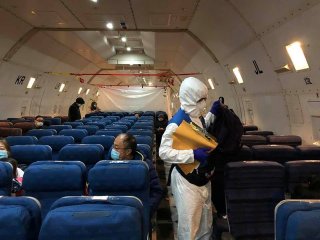How Corporations Can Make Better Emergency Evacuation Plans During a Pandemic
Are you ready?
In 1977, the U.S. Embassy in Moscow caught fire. Staff had to evacuate the building as the local fire service responded to the blaze. While it was later determined the fire was an accident, the Soviet intelligence services capitalized on the incident: Some of the firefighters who entered the building were actually KGB officers, looking to exploit the unique opportunity to rummage through the embassy. Still, American personnel worked as escorts alongside the firefighters to make sure that nothing was amiss and some especially sensitive areas of the embassy were left to burn because they were better destroyed than exposed to the scrutiny of the Soviet Union's security services.
Many people show valor and courage during crisis events, but just as many see a crisis as an opportunity to loot and pillage. Foreign compounds, especially in developing countries, are usually areas of higher living standards. When disaster strikes and security falters, opportunists move in to pick up the scraps. Leading up to the 1991 evacuation from Mogadishu, U.S. Embassy staffers were instructed to leave keys in the ignition of their cars so looters could just drive off with them rather than risk violent confrontations. The U.S. Embassy in Sanaa, Yemen, experienced a similar situation when Houthi rebels stole embassy vehicles from the compound shortly before evacuation in 2015. When vehicles are soon to be abandoned anyway because of evacuation, such sacrifices are relatively small. However, there are some materials that can't be abandoned. Confidential documents, sensitive technology and, in some cases, defensive weapons could fall into the wrong hands. During an evacuation, there is usually not enough space to take these things, so staff have to resort to destroying them.
In a private business environment, destroying intellectual property, personally identifiable information, sensitive material and technology may be acceptable if there are backups elsewhere, but unique artifacts are much better off evacuated under more controlled circumstances. In a place such as South Korea, a hub of technology and scientific research, multinational corporations and research institutions are pursuing make-or-break projects that would be devastating if destroyed in fighting but perhaps even more damaging if they were compromised by rivals. While the risk of a major evacuation from Seoul or the larger Korean Peninsula seems to be much smaller than in Venezuela, the impact would be several magnitudes larger because of the value of intellectual property stored there versus Caracas. These kinds of considerations must be taken into account when planning an evacuation and making contingency plans.
Options Offer Flexibility
It is impossible to be completely prepared for an evacuation because there are simply too many unknowns and, because of the observer effect, our own actions can affect the outcome. Options need to be in place ahead of time so you can be flexible on how to carry out the specifics. Venezuela and the Korean Peninsula are hot points now but next year or even next month, the country or region in the hot seat could be different. Natural disasters or other forms of unexpected crises regularly catch us by surprise. Instead of waiting until a situation deteriorates to prepare and practice an emergency plan, draft plans during times of stability and peace. Develop trip wires that everyone agrees will signify what to do and when. Setting expectations and sticking to plans is one of the surest ways to stay calm during a crisis and prevent complacency. Doing this during peacetime not only allows an organization to make plans with a level head, but regularly drilling for emergencies means that when a crisis emerges, a continuation of drills will raise less suspicion than the beginning of new ones.
Relying on foreign government evacuation procedures may ensure that people get out alive, but it won't ensure any sense of continuity in their lives or work. Designing and implementing a plan and getting out before the window of opportunity is too narrow is an imperative that cannot be ignored.
Plan. Prepare. Avoid a Mad Dash When Crisis Erupts is republished with the permission of Stratfor Worldview, a geopolitical intelligence and advisory firm. Image: Reuters.

